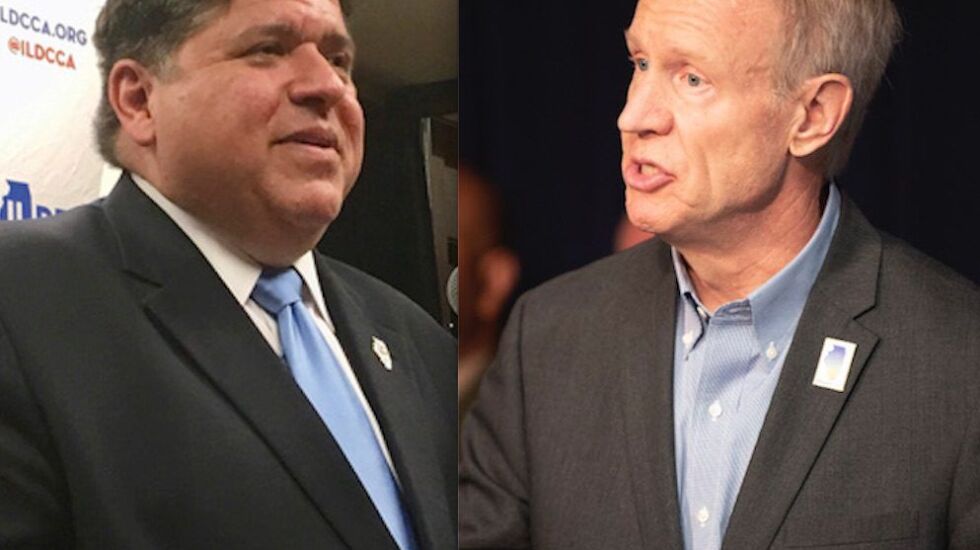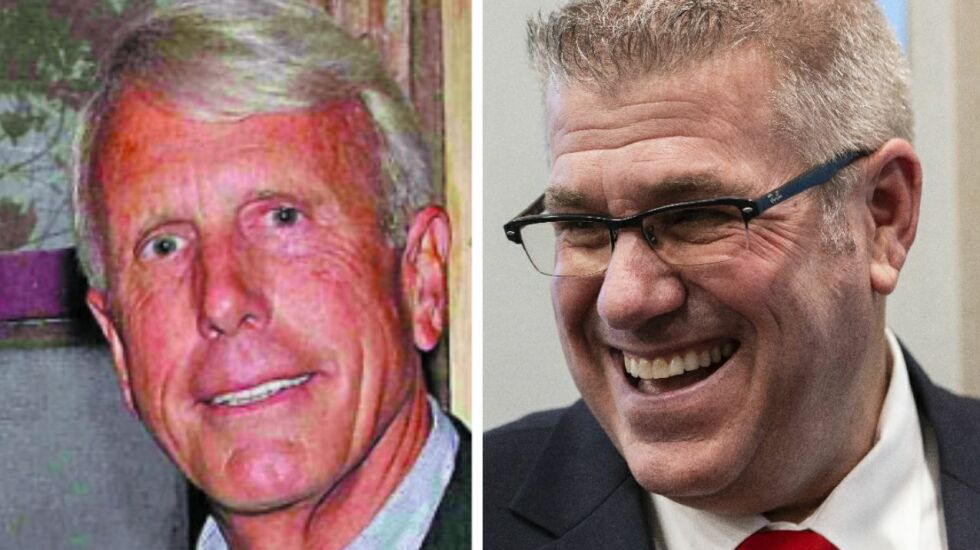EFFINGHAM, Ill. — Republican gubernatorial nominee Darren Bailey acknowledged Wednesday that he’s a millionaire — but, like his big backer former President Donald Trump, the downstate farmer and state senator is refusing to release copies of his income tax returns.
“Right now, I see absolutely no reason in doing that. I don’t see that as a qualifier,” Bailey said in an interview with the Sun-Times on Wednesday.
The tradition of Illinois gubernatorial nominees releasing their tax returns before the November election dates back to Republican Gov. Jim Thompson in 1976, at least. It isn’t required of candidates or elected officials. But the voluntary practice provides accountability for a statewide officeholder who will ultimately collect and manage state tax dollars — and also sheds light on potential conflicts.
But Bailey — who has painted his candidacy as a fight for “working families, parents, taxpayers, law enforcement and everyday citizens” — said he’s not interested in disclosing his returns.
“I don’t care what Gov. [J.B.] Pritzker’s tax records are,” Bailey told the Sun-Times. “I definitely see an out-of-touch and elitist billionaire that’s completely out of touch with the people. And that’s nothing that I’ve ever desired to see from anyone, and I certainly don’t think that’s a qualifier to run for state or any form of government.”
Pritzker and Illinois first lady M.K. Pritzker reported earning a little over $5.1 million in adjusted gross income last year, according to partial 2020 state and federal tax returns released in October 2021.
During the 2018 gubernatorial campaign, Pritzker and former Republican Gov. Bruce Rauner each released their two-page tax cover sheets, but neither disclosed their full returns, which would have included schedules filed to claim exemptions and charitable donations.
During that campaign, Rauner lit into Pritzker for being a billionaire, but reporting just $16 million in income. The Republican argued Pritzker was either hiding his efforts to avoid paying taxes or was “one of the worst investors on the planet.”

Pritzker’s current net worth is an estimated $3.6 billion, according to Forbes.
On Wednesday, the Sun-Times asked Bailey — who owns a family business that includes a farm, trucking company and excavation company — if he’s a millionaire.
“I have farm ground,” Bailey said. “So yeah, I guess that’s a fair statement.”
As for the billionaire who backed him, Bailey said he expects it to continue now that he’s the GOP nominee.
The state senator from southern Illinois enjoyed $9 million in campaign donations from Lake Forest mega donor Dick Uihlein, who also gave $8.1 million to another group that helped Bailey and attacked rival candidate Richard Irvin.
“I don’t think anyone would have helped us this far along only to step back,” Bailey said of Uihlein. “I think everyone is absolutely impressed of how the people of Illinois turned out, how our message and work ethic resonated.
“And I think we’re going to be able to build with new supporters.”
Bailey’s primary campaign was also boosted by millions in advertising paid for by the Democratic Governors’ Association and Pritzker himself — in the belief that Bailey would be the easiest candidate to beat in November.
Now that the primary is over, the Democrats are expected to focus all their attention on Bailey — and not to help him out, this time.

Pritzker spent $171.5 million to win in 2018 – and is expected to dig deep this year as well.
“I am not worried one bit,” Bailey said Wednesday.
“I don’t care how much this man spends,” Bailey said. “The people of Illinois are going to understand the truth.”
Pritzker has already dubbed Bailey “Donald Trump’s candidate,” but Bailey said he hasn’t had any talks with the former president about further support in the general election. And he seemed to want to be his own man a day after his resounding primary victory, especially as Pritzker’s campaign plans to use Trump’s endorsement as a focal point.
“I was honored. Whatever he would want to do, I would welcome,” Bailey said of Trump. “But at the end of the day, it’s Darren Bailey who the people are going to vote to elect. ... They’re voting for me and me only, and my policies, my beliefs. And I think that’s going to win the day.”
Bailey, who has been credited for his grassroots campaign efforts that included almost daily Facebook videos and hundreds of campaign stops, said he has no plans to hire outside groups to take over his campaign.
“A grassroots campaign. That’s what I ran from Day One,” Bailey said. “So, we will remain and retain control. If I turn this campaign to someone else, then this campaign becomes about something else then these values and desire to restore Illinois.”
In his victory speech on Tuesday, Pritzker chided his newly minted opponent, saying, “Yes, Darren Bailey, you have to love Chicago,” to run for Illinois governor.
Bailey famously called Chicago a “hellhole” during a televised debate and once introduced a House resolution to separate Chicago from the rest of the state. At his election night party in downstate Effingham, Bailey was asked whether he should change up his Chicago rhetoric in his general election campaign.
“I didn’t speak rhetoric. I spoke truth,” he told reporters.
Despite the city bashing, Bailey fared very well among Chicago Republicans, leading the six-candidate field with 45.74% of the vote.
On Wednesday, Bailey said he does indeed “love” visiting Chicago, but quickly pivoted to criticisms of the Democratic governor’s handling of the city.
“I love going there and shopping and eating and raising our children up. We’ve been to the museums and Navy Pier,” Bailey said. “And it is interesting, because the governor says he loves all of Illinois, but he shut Illinois down. He kept children at home. He sent workers home.”
He added, “This is all upside down and backwards in Chicago right now.”
“So I’ll be bringing common sense solutions to the table,” Bailey said.







